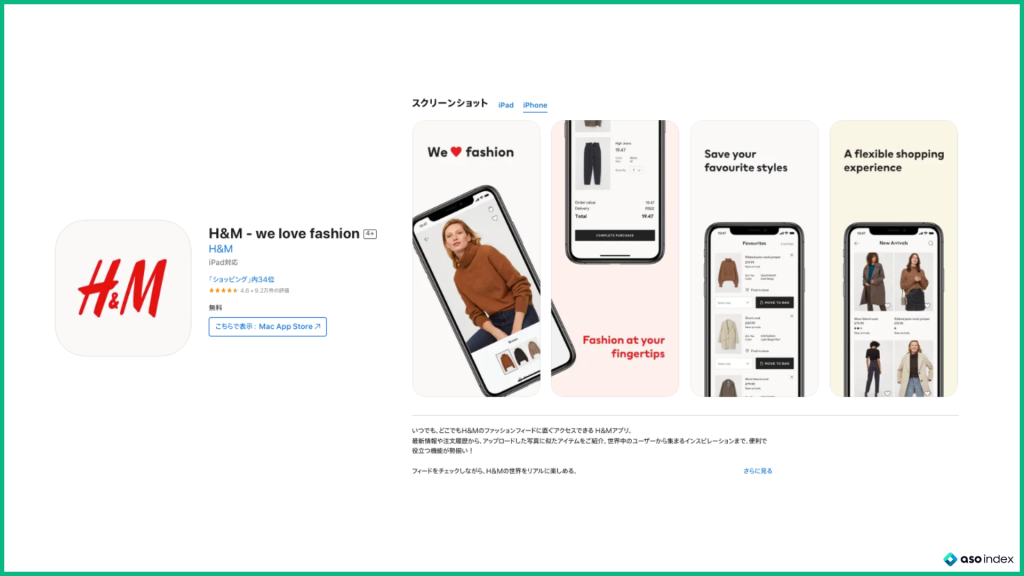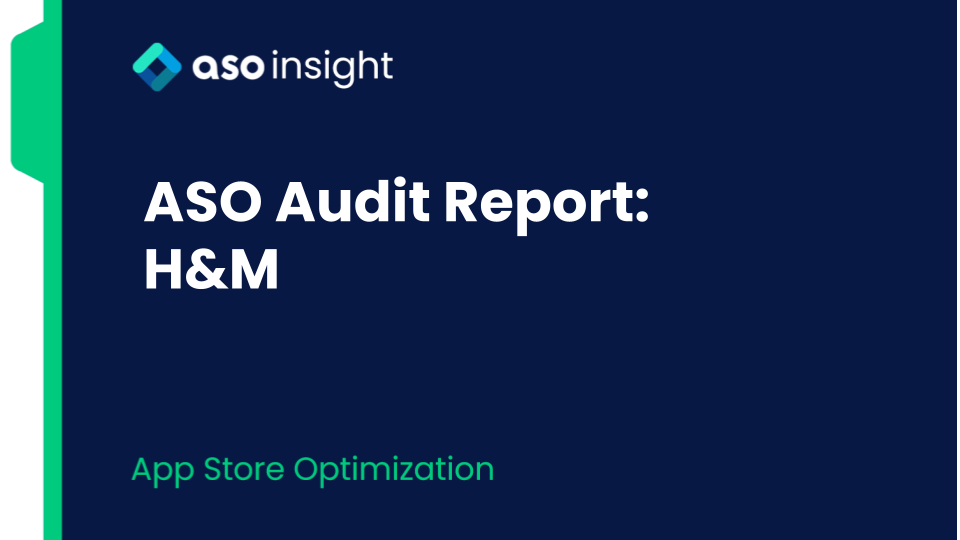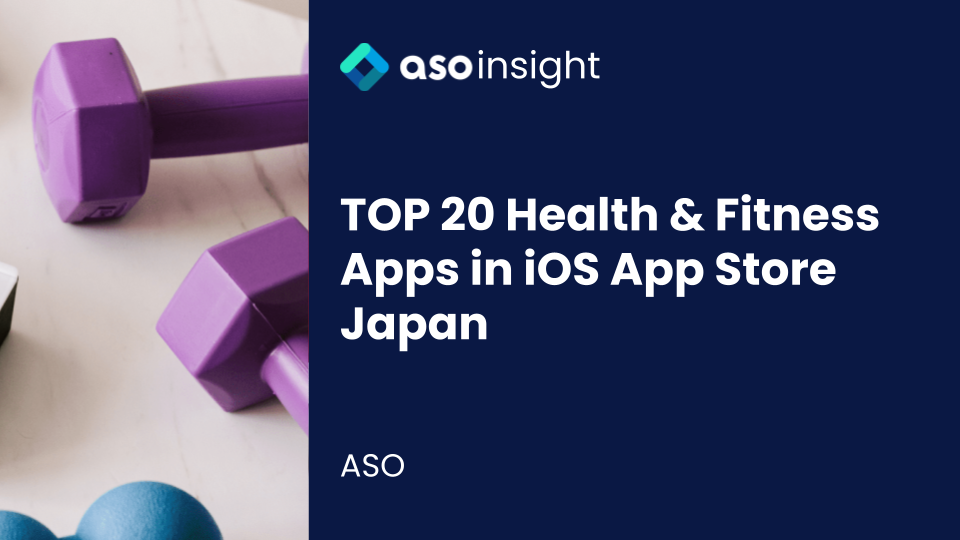Introduction

“H&M – we love fashion” on App Store Japan (As of: Nov. 7, 2023)
The H&M app, currently holding the 21st rank in the Shopping Category within the App Store Japan, shows potential for improvement in App Store Optimization (ASO). With an ASO score of 195/300, it becomes evident that there’s considerable room for enhancing visibility and ranking. This article aims to explore and address areas of improvement for the H&M app’s ASO. In this specific ASO Audit, we will be using ASO index as our tool to analyze the ASO standing of H&M app as well as suggest things to improve in terms of ASO.

- Visibility Score: 55/100
- ASO Score: 195/300
- Ranking: 21st on Shopping Category
Analysis using the ASO index reveals a Meta Keyword Optimization Score of 45/100, emphasizing the need for significant improvement. Suggestions from the ASO index highlight the necessity of enhancing the subtitle with meaningful keywords to increase visibility and searchability within the app store.

With this in mind, let’s do a quick keyword analysis of the current metadata of H&M app in Japan and see the things we can improve.
Keyword Research
Title
- App title: “H&M – we love fashion”
- Character count: 21/30
- Keywords on Title – Search Volume & Ranking:
- “H&M”: Search Vol. 67, ranking 1
- “we”: Search Vol. 45, ranking 28
- “love”: Search Vol. 38, ranking 65
- “fashion”: Search Vol. 57, ranking 12
The app’s title, “H&M – we love fashion,” utilizes only 21 characters out of the available 30. To maximize visibility, it’s advisable to localize the title for the Japanese app store by including keywords in Japanese, as users in this market typically search in their native language. This can potentially improve the app’s discoverability. Utilizing the entire character limit available, H&M has the opportunity to notably enhance its visibility in the store, facilitating the creation of a more descriptive and impactful title that better embodies the app and its array of features.
Subtitle
- App Subtitle: Not optimized
Currently, the Subtitle is not utilized. App Store allows up to 30 characters for Subtitle, and H&M can take advantage of these 30 characters to fill in with meaningful keywords to increase visibility
Keywords H&M might consider adding:

To bolster its visibility and search ranking, H&M should consider incorporating additional keywords. These keywords can be sourced from competitor metadata, the current app description, and AI-driven keyword suggestions available in the ASO index. When selecting these keywords, it’s crucial to evaluate their search volume, chance of ranking, level of difficulty, the number of apps using the keyword, and the potential search ranking impact. Assessing these factors will aid H&M in identifying and implementing strategic keywords that can effectively enhance the app’s visibility and performance in the app store.
Creative Optimization (CRO)
- Number of Screenshots: 4/10
- App Preview Video: None

Review Score Optimization

H&M has maintained a favorable rating of 4.58, indicating a strong performance over the past month. It’s essential to continue delivering excellent service to maintain and potentially improve these ratings further.

Picked keywords from Positive Reviews:
- シンプル = simple
- 選択 (sentaku) = selection, option
- デザイン = design
Picked keywords from Negative Reviews:
- 決済 (kessai) = settlement, payment of account
- 在庫状況 (zaikojoukyou) = inventory status
- 登録 (touroku) = registration
Leveraging insights from the reviews keyword cloud feature of the ASO index, H&M can focus on areas highlighted by users, both positive and negative. Encouraging a “better service” approach can lead to higher reviews. This data acts as a guide, helping comprehend user opinions and enabling the app to strategically enhance its service delivery. Improved service quality results in a rise in positive reviews.
Summary of Recommendations:
Continuous Keyword Testing and Analysis: To improve the app’s search ranking and visibility, continuous testing of various keywords is essential. This involves systematically trying out different keywords, observing their impact on search rankings, and analyzing their effectiveness. By monitoring how each keyword influences the app’s discoverability, developers and marketers can make informed adjustments to optimize the app’s search performance.
Proper Localization of Metadata and Visual Assets: Localizing metadata and visual assets involves tailoring these elements to resonate with the preferences, language, and culture of the target audience—in this case, the Japanese market. It means not only translating content but also adapting it to align with cultural nuances and preferences. In the case of the H&M app in Japan, using Japanese keywords, culturally relevant descriptions, and visual content that aligns with local expectations can significantly improve the app’s appeal and connection with Japanese users.
Maximizing Metadata Space, Including Subtitle Utilization: The optimization of metadata space, especially the subtitle, plays a crucial role in app store visibility. The available characters for title and subtitle must be fully utilized to provide a clear and descriptive representation of the app. The subtitle, often overlooked, is an opportunity to include more keywords or descriptive phrases, improving the app’s chances of being discovered in searches. By maximizing this space, developers can enhance the app’s search visibility and ranking.
Utilizing the Option to Add an App Preview Video: Incorporating an app preview video offers a dynamic and interactive way to engage potential users. This video presents an opportunity to showcase the app’s features, interface, and functionalities, providing users with a glimpse of the app experience before download. Such previews can significantly impact user engagement and increase the likelihood of app installations, as they offer a visual demonstration of the app’s value and features.
Implementing these suggestions collectively will refine the app’s visibility, user engagement, and overall performance within the Japanese market, aligning it more closely with user expectations and preferences.






